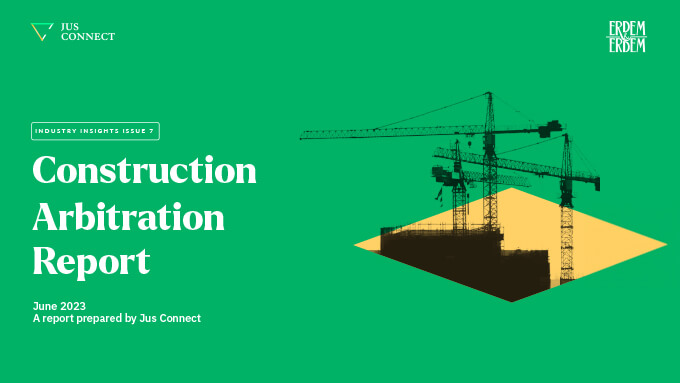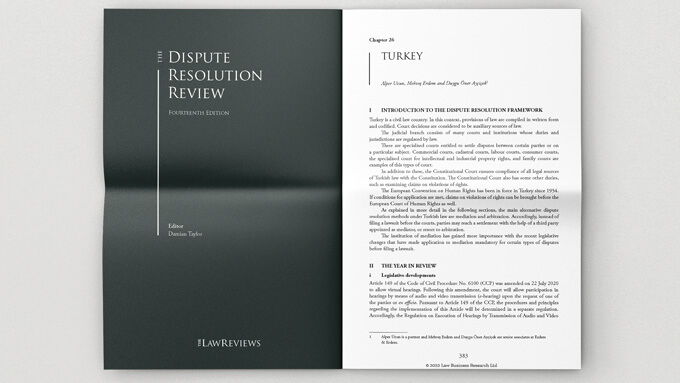Arbitration Bulletin 2023
Authors: Melissa Balıkçı Sezen, Tilbe Birengel, Mehveş Erdem Kamiloğlu, Duygu Öner Ayçiçek, Ece Özsü, Ceren Eke
Developments in Türkiye
Important Court Decisions
The Court of Cassation Has Ruled That the Selection of Arbitrators by an Institution Closely Linked to the Respondent, Whether Organically, Legally, or Economically, Is Not Ground For Set Aside
The Court of Cassation[1] made the following findings:
- In the contract between the parties, an institution was designated to select the arbitrators. Despite the claimant's assertion of an organic connection between the said institution and the respondent, its involvement cannot serve as grounds for set aside, as it was mutually agreed upon by the parties.
- The objection regarding the expert's prior internship with one of the arbitrators, which could potentially compromise the arbitrators' impartiality, was not raised during the arbitration proceedings. Consequently, this objection was waived and cannot be considered under the révision au fond, as it is deemed that the right to object has been waived.
- The arbitral tribunal has the discretion to decide whether or not to obtain an expert report, and the determination and evaluation of the applicable rules of law are within the jurisdiction of the arbitral tribunal.
The Regional Court of Appeal Ruled That the Provision on Court Jurisdiction in the General Credit Agreement Would Not Invalidate the Arbitration Agreement in the Surety Agreement
The Court[2] made the following findings:
- A prudent merchant's application to mandatory mediation instead of arbitration does not affect the validity of the arbitration agreement.
- The absence of an objection to arbitration by the respondents during the mandatory mediation does not contravene the principle of good faith.
- The determination of the competent court in the general loan agreement between the claimant and the third-party debtor does not affect the validity of the arbitration agreement in the separate suretyship agreement.
The General Assembly of Court of Cassation Ruled That the Arbitration Agreement in the Contract Will Not Remain Valid After the Term of the Contract Expires Even If the Relationship Between the Parties Continues
The General Assembly of the Court of Cassation[3] made the following findings:
- The arbitration agreement is independent of the main contract, whether formed separately or included within it. Just as the invalidity of the main contract does not render the arbitration agreement void, the invalidity of the arbitration agreement does not affect the validity of the main contract.
- The most fundamental element of an arbitration agreement is the will of the parties and this will must be clearly and unambiguously understood from the arbitration agreement.
- In the concrete case, the parties entered into distributorship contracts of various durations containing arbitration agreements. After the expiration of the last contract, a new contract negotiation period started between the parties, but the parties could not reach an agreement. Nevertheless, the relationship between the parties continued.
- Despite the continuation of the relationship between the parties, it cannot be accepted that the relationship between the parties continued exactly within the framework of the last expired contract and that the terms of this contract were accepted by the parties as is. This is because the previous contract explicitly required the parties to make a clear declaration of intent to extend its duration.
- Similarly, it cannot be said that the arbitration agreement will be applied within the framework of the ongoing relationship. The arbitration agreement is not a provision in the last contract between the parties; rather, it is a separate agreement, and there is no evidence of the parties' intention to extend the arbitration agreement. As the parties do not have a clear intent in this regard, the dispute cannot be brought to arbitration.
- During the discussions at the General Assembly of the Court of Cassation, the argument that the existence of the arbitration agreement persists despite the contract's implicit extension, along with the assertion that some provisions of the contract remain in effect while others do not, lack legal basis. Therefore, although it is claimed that the arbitration agreement between the parties remains in force, this view was not adopted by the majority.
The Court of Cassation Ruled That Arbitral Awards Accepting Compound Interest Claims Do Not Violate Public Order
The 11th Civil Chamber of the Court of Cassation[4] upheld the following findings of the Court of First Instance and the Regional Court of Appeal regarding the enforcement of the arbitration award:
- If the general terms of business or standard agreements to which the parties refer in their contracts contain an arbitration agreement, such reference shall be deemed to constitute the conclusion of an arbitration agreement.
- An arbitration agreement shall be deemed to have been concluded if a reference is made to a document containing an arbitration agreement to make it part of the main contract.
- Due to the révision au fond as objections to the appointment of arbitrators were not raised during the arbitration proceedings, the respondent's objection in this regard is not considered valid.
- Ruling of compound interest in the arbitral award does not violate public order.
The Court of Cassation Ruled that State Courts Have Jurisdiction to Hear Appeals Against Interim Injunctions in Disputes Involving Arbitration Agreements
The Presidium of the Istanbul Regional Court of Justice, upon identifying conflicting decisions among various chambers of the Regional Court of Appeals regarding the competent authority to address objections to interim injunction decisions in cases where Turkish courts issue preliminary injunctions concerning disputes subject to arbitration with foreign elements, subsequently petitioned the Court of Cassation to resolve these discrepancies.
The Court of Cassation[5] made the following findings:
- An examination of Article 6 of the International Arbitration Law (IAL) and its preamble reveals that the arbitrator or arbitral tribunal is not authorized to modify or set aside an injunction granted by the court.
- The non-enforcement of an interim injunction granted in an arbitral proceeding outside of Türkiye and the inability to evaluate the objection to the interim injunction granted in Türkiye within the scope of such arbitral proceeding will deprive the parties of the protection provided by the interim injunction.
- Despite the existence of an arbitration agreement, an interim injunction may be requested from the Turkish courts about a dispute involving a foreign element.
- Objections against interim injunctions issued by Turkish courts will also be heard by Turkish courts, regardless of whether a case has been filed in arbitration.
The Court of Cassation Ruled That the Insurer Is Also Subrogated to the Arbitration Agreement in the Legal Relationship It Insures
The 11th Civil Chamber of Court of Cassation[6] upheld upheld the following findings of the Court of First Instance and the Regional Court of Appeal in relation to the first objection to arbitration:
- The sales contract and its appendices, including the arbitration agreement, which is performed by the parties, are binding for the insured.
- The arbitration agreement concluded by the assured also binds the insurance company as its successor.
The Court of Cassation Ruled That Agreements Stipulating Arbitration for Certain Disputes and Resorting to State Courts for Others are Valid
The 11th Civil Chamber of the Court of Cassation[7] upheld the following findings of the Court of First Instance and the Regional Court of Appeal about the first objection to arbitration:
- If it is explicit and clear which disputes are subject to arbitration, the arbitration agreement is valid.
- The arbitration agreement in the contract is not conditional, but it is prepared in stages, and these stages do not nullify the arbitration agreement.
The Court of Cassation Decided That Actions for Annulment of Objection Can Be Held in Arbitration and Arbitrators Can Award Execution Denial Compensation
The 6th Civil Chamber of the Court of Cassation[8] upheld the following findings of the Regional Court of Appeal:
- An action for annulment of objection is arbitrable.
- The objection that the execution denial compensation cannot be awarded is not appropriate.
The Court of Cassation Ruled That Filing a New Lawsuit in the Court of First Instance After Raising an Objection to Arbitration in Another Case Is Contrary to Good Faith
The 6th Civil Chamber of the Court of Cassation[9] approved the following findings of the Court of First Instance and the Regional Court of Appeal:
- The court found that the claimant argued that the arbitration agreement was invalid and that the respondent had to prove the arbitration agreement between them, whereas the same claimant, as the respondent in another case, objected to arbitration based on the same agreement.
- The court found that the claimant's assertion of the invalidity of the arbitration agreement in the present case while relying on the objection to arbitration in another case violated the principle of good faith.
The Court of Cassation Ruled That the Absence of the Parties’ Signatures on the Page of the Contract Containing the Arbitration Agreement Does Not Invalidate the Arbitration Agreement
In the relevant decision, the Court of Cassation[10], considering the content and meaning of the text of the contract and the integrity of the following clauses, evaluated that the parties’ will to arbitrate exists even if there is no signature of the parties on the page containing the arbitration agreement according to Article 2/2 of the New York Convention.
Important Developments on Legislation and Arbitration Rules
Istanbul Arbitration Center (“ISTAC”) Updated Its Rules on Costs and Fees Tariff
The upper limit for the application of ISTAC[11] serial arbitration rules has been updated as TRY 3,000,000 as of 01.01.2023 and TRY 5,000,000 as of 01.02.2024.
Regulation Amending the Regulation on Arbitration in Insurance Has Been Published
Amendments to the Regulation on Arbitration in Insurance (“Regulation”) [12] entered into force after being published in the Official Gazette on 07.06.2023. Accordingly, additions were made to the definitions section of the Regulation and the duties of the Commission Presidency were expanded, such as maintaining expert lists. The Regulation introduced the possibility to apply to the Insurance Arbitration Commission electronically. In addition to these amendments, there are also provisions for the electronic submission of documents required for dispute applications and for the rapporteurs to take into account enforcement proceedings by the Enforcement and Bankruptcy Law during their preliminary examinations. In addition, the deadlines for arbitrators to render decisions have been amended and limits have been introduced on the number of cases to be assigned to arbitrators.
Developments in the World
Important Court Decisions and Arbitral Awards
Decisions of the United Kingdom Supreme Court and Permanent Court of Arbitration
- Nigeria v. P&ID Decision
The High Court of Justice the Business and Property Courts Of England & Wales, King’s Bench Division Commercial Court based in London overturned an arbitral tribunal’s nearly $11 billion award in Nigeria v. P&ID case[13]. It was found that P&ID had bribed a former legal director at the Ministry of Petroleum, thus the proceedings were influenced by this corruption since Nigeria was unable to mount a real defense during the arbitration. Accordingly, an important ruling drew attention to corruption in international arbitration. The decision criticized the arbitration process, stating that it failed to uncover the truth and resulted in a significant injustice for Nigeria.
- Republic of Mozambique v. Privinvest Shipbuilding SAL and Others Decision
Mozambique has filed a $2 billion lawsuit in the English courts seeking damages for alleged corruption in a commercial relationship with an Abu Dhabi-based company and other defendants. Privinvest Shipbuilding SAL and the other respondents[14] argued that Mozambique's claims were covered by the supply contract, which contained an arbitration clause, and sought a stay of proceedings pending a decision in arbitration. Despite conflicting rulings from lower courts, the United Kingdom Supreme Court unanimously ruled that Mozambique's claims were not within the scope of the arbitration clause.
- Islamic Republic of Pakistan v. Republic of India Decision
The Permanent Court of Arbitration (“PCA”) issued its decision[15] on the jurisdiction of the arbitral tribunal in an arbitration judgment initiated by Pakistan against India. The dispute concerns the design of an Indian hydroelectric project on the KHEP river and its compliance with the Indus Waters Treaty of 1960. The PCA held that it had jurisdiction to hear the case, notwithstanding India’s absence in the judgment, based on paragraph 16 of Annex G of the treaty. In its decision, it considered that the issues raised were covered by the provisions of the treaty, that the arbitral tribunal was properly constituted, and that the appointment of a neutral expert by the World Bank at India’s request would not preclude the arbitral tribunal’s jurisdiction. Consequently, the arbitral tribunal found itself eligible to consider Pakistan’s request for arbitration and deferred the unresolved issues for further consideration.
Investment Arbitration Decisions
- Supreme Court of Paris on the Crimean War Decision
Oschadbank was a state-owned bank with investments in Crimea. Like other investors in Crimea, it initiated investment treaty arbitration proceedings against Russia. Oschadbank claimed that its assets were unlawfully expropriated by Russia and the arbitral tribunal ruled in favor of the investor in 2018 for compensation of USD 1.1 billion plus interest from Russia.
However, Russia applied to the Paris Court of Appeal for annulment of the award and the court annulled the award and ruled that the arbitral tribunal lacked jurisdiction and annulled the award.
The Supreme Court of Paris upheld[16] the PCA award[17] against Oschadbank, providing compensation for the damage caused to Oschadbank, a Ukrainian bank, as a result of Russia’s annexation of Crimea in 2014.
Important Developments on Arbitration Institutions and Rules
ICC Commission on Arbitration and ADR Published the Guide to Effective Conflict Management and Report on Facilitating Settlement in International Arbitration[18]
The International Chamber of Commerce (“ICC”) Commission on Arbitration and ADR has published a guide[19] and report[20], which aim to raise awareness of the different dispute resolution techniques in international arbitration and facilitate dispute resolution. The Guide to Effective Conflict Management guides on selecting the most appropriate alternative dispute resolution (“ADR”) technique and using it effectively. This avoids increased costs, resolves disputes and reduces the cost of inevitable disputes before or after arbitration proceedings commence. The Guide divides these mechanisms into two main categories: (i) preventive dispute management and (ii) dispute management by independent persons and rules. The Guide describes the ICC Dispute Resolution Services available and provides examples of how they can be used.
The Report on Facilitating Settlement in International Arbitration provides dispute resolution mechanisms even after the commencement of proceedings to preserve relations between the parties. It includes chapters on dispute management techniques, mediation windows and protocols, and preliminary views and conciliation conferences.
2023 Edition of the ICC Rules on Combatting Corruption Have Been Published[21]
ICC Rules on Combatting Corruption guides both businesses and governments in their efforts to combat bribery and extortion. They encourage businesses to maintain high standards of integrity in their transactions while helping them fulfill their legal obligations and navigate global anti-corruption initiatives. In the 2023 edition, the Rules have streamlined whistleblowing mechanisms and strengthened the section on the management of third parties.
ICC Released Guide for Disability Inclusion in International Arbitration and ADR by the International Commission on Arbitration and ADR[22]
The Guide aims to provide clear guidance on meeting the needs of persons with disabilities participating in various dispute resolution processes. It aims to promote the inclusion of persons with disabilities in the field of dispute resolution by providing practical tools, recommendations, and checklists.
Law Commission of England and Wales Published Final Report and Bill on 6 September 2023 Following Review of the Arbitration Act 1996, Final Report and Bill[23] Entered into Force as of 21 November 2023
The report of the Law Commission of England and Wales addresses many aspects of the practice of arbitration, including confidentiality in arbitral proceedings, the independence and transparency of arbitrators, the prompt resolution of disputes, challenges on points of law, the powers of courts and emergency arbitrators, and the law governing the arbitration agreement. In general, the Law Commission considered that no large-scale reform was needed or desirable and recommended only limited amendments to the Law.
Germany’s Ministry of Justice Announced Start of Work on Revision of Arbitration Law[24]
Germany’s Ministry of Justice has published a Report proposing comprehensive updates to the country’s arbitration laws. The Report is a comprehensive effort to modernize Germany’s arbitration laws and strengthen its position in the global arbitration landscape. The main recommendations include removing form requirements for arbitration agreements, clarifying the procedures for appointing arbitrators in multilateral arbitrations and providing reasons for challenging adverse jurisdictional awards. It also makes proposals such as allowing video conferences in arbitration procedures, allowing the publication of arbitral awards with the consent of the parties, and facilitating the submission of English-language documents to courts. In addition, the Ministry considers future measures such as establishing Commercial Courts for high-value commercial matters and offering the possibility to litigate in English if the parties agree, implementing emergency arbitration practices and addressing discriminatory opinions.
Saudi Arabian Center for Commercial Arbitration (“SCCA”) Published 2023 Arbitration Rules[25]
These rules are a significant update to the previous version adopted in 2016. Among the main changes is the establishment of the SCCA Court of Arbitration, which is given various powers, such as arbitrator appointments and cost determinations. In addition, the updated rules emphasize electronic filings and the use of electronic signatures in arbitral awards. Procedural improvements include the ability to consolidate arbitrations arising from multiple contracts and the expansion of the jurisdiction of arbitral tribunals. These tribunals have various powers, such as presiding over hearings and encouraging conciliation efforts. These rules, which entered into force on 1 May 2023, aim to streamline arbitration processes and strengthen Saudi Arabia’s position in the field of alternative dispute resolution.
Stockholm Chamber of Commerce Arbitration Institute (“SCC”) Published 2023 Arbitration Rules (“2023 Rules”)[26]
2023 Rules shall apply to arbitral proceedings commenced after 1 January 2023. The revisions made to the SCC Rules dated 2017 include wording updates and provisions related to the powers of arbitrators Arbitral tribunals are now granted the power to (i) determine how the hearings will be conducted (article 32), (ii) terminate the proceedings when necessary (article 45/2) as well as when a party fails to pay the advance on costs (article 51/5).
ICC Published the Sustainable Trade Principles: Wave 2[27]
ICC has published the Sustainable Trade Principles: Wave 2, which provides a framework for assessing both the environmental sustainability of a transaction and how it supports socio-economically sustainable development. These principles are designed to support businesses in meeting both the Paris Agreement’s goal of limiting global warming to 1.5°C above pre-industrial levels and the UN Sustainable Development Goals.
On 19 January 2023, the ICC Declaration on Dispute Prevention and Resolution Highlighting Principles for the Next Century was Published[28]
The ICC Declaration on Dispute Prevention and Resolution reflects the visionary spirit of the ICC’s founders, known as the “Merchants of Peace”, who established the ICC Court a century ago to promote integrity, access to justice and the rule of law in international commercial arbitration. The Declaration sets out the principles that define a modern framework for ICC dispute resolution services, emphasizing priorities such as ensuring fair access to justice, preserving impartiality and independence in dispute resolution, promoting innovation in dispute resolution methods, expanding the global reach of arbitration and alternative dispute resolution, enhancing transparency, providing training and capacity building initiatives around the world, promoting diversity and inclusion, implementing sustainability measures, and collaborating with global partners to advance these goals.
Netherlands Arbitration Institute Published New 2024 Arbitration Rules[29]
The Netherlands Arbitration Institute has announced the entry into force of new arbitration rules to be effective as of 1 March 2024 (NAI Arbitration Rules 2024). These new rules introduce innovative tools to enable disputes to be resolved even more efficiently and promptly, introduce additional safeguards for the independence and impartiality of arbitrators, make efficiency and quality improvements, introduce expedited arbitration, and focus on sustainability, diversity, and inclusion. The developed arbitration platform aims to facilitate secure electronic communication.
Suriname became a Party to the New York Convention, the Convention entered into force on 8 February 2023[30]
Albanian Parliament Adopted a New Arbitration Law Based on the UNCITRAL Model Law to Encourage More Foreign Investment in the Country[31]
You can download PDF version of the bulletin here.
- 6th Civil Chamber of Court of Cassation, E. 2023/989, K. 2023/1241, 28.03.2023.
- Istanbul Regional Court of Justice 14th Civil Chamber, E. 2022/438, K. 2023/610, 06.04.2023.
- The General Assembly of Court of Cassation, E. 2023/11-103, K. 2023/1185, 29.11.2023.
- 11th Civil Chamber of Court of Cassation, E. 2020/7985, K. 2022/4932, 16.06.2022.
- 6th Civil Chamber of Court of Cassation, E. 2022/3529, K. 2022/4699, 12.10.2022.
- 11th Civil Chamber of Court of Cassation, E. 2020/7127, K. 2022/3980, 24.05.2022.
- 11th Civil Chamber of Court of Cassation, E. 2021/4688 K. 2022/9097, 14.12.2022.
- 6th Civil Chamber of Court of Cassation, E. 2023/260, K. 2023/544, 13.02.2023.
- 6th Civil Chamber of Court of Cassation, E. 2023/291, K. 2023/259, 25.01.2023.
- 11th Civil Chamber of Court of Cassation, E. 2021/9200, K. 2023/2895, 11.05.2023.
- You can read the announcement for changes as of 01.05.2023 in Turkish here; the announcement for changes as of 01.01.2024 in Turkish here.
- You can read the regulation in Turkish here.
- The High Court of Justice the Business and Property Courts Of England & Wales, King’s Bench Division Commercial Court, Neutral Citation Number: [2023] EWHC 2638, https://www.judiciary.uk/wp-content/uploads/2023/10/Nigeria-v-PID-judgment.pdf
- United Kingdom Supreme Court, Republic of Mozambique v. Privinvest Shipbuilding SAL and Others [2023] UKSC 32, https://www.supremecourt.uk/cases/docs/uksc-2021-0085-judgment.pdf.
- You can read the announcement here.
- Oschadbank v. Russian Federation, Judgment of the Supreme Court of Paris, No: 21-15.390.
- Oschadbank v. Russian Federation, PCA Case No. 2016-14.
- For detailed information on Guide, see. Kamiloğlu Erdem, Mehveş: “ICC Guide on Effective Management of Disputes”, Erdem & Erdem Newsletter, June 2023, https://www.erdem-erdem.av.tr/en/insights/the-icc-guide-on-effective-conflict-management.
- You can read the guide here.
- You can read the report here.
- You can access here.
- You can access here.
- You can access here.
- You can access here.
- You can access the announcement here; detailed reviews here.
- You can access here.
- You can access here.
- You can access here.
- You can access the announcement here.
- You can access the announcement here.
- You can access here.
All rights of this article are reserved. This article may not be used, reproduced, copied, published, distributed, or otherwise disseminated without quotation or Erdem & Erdem Law Firm's written consent. Any content created without citing the resource or Erdem & Erdem Law Firm’s written consent is regularly tracked, and legal action will be taken in case of violation.



